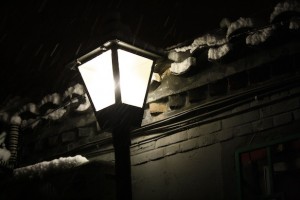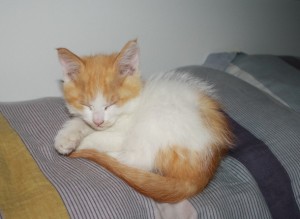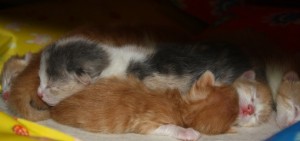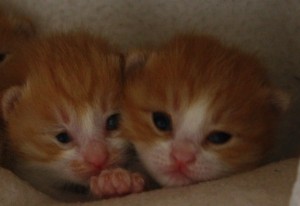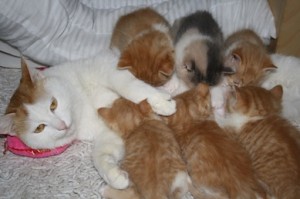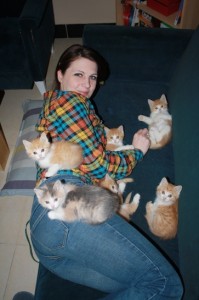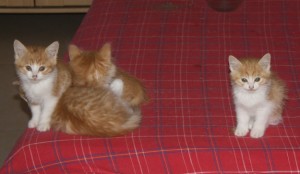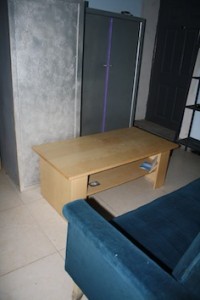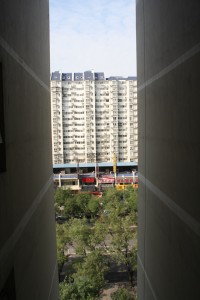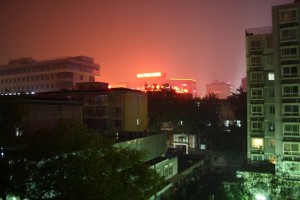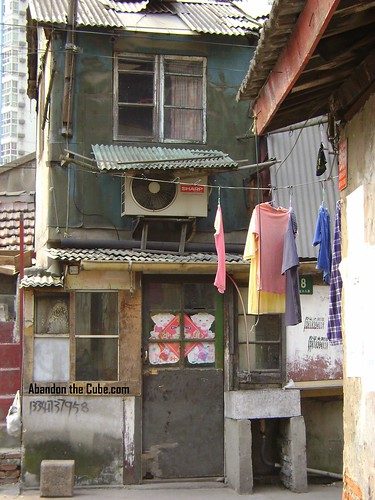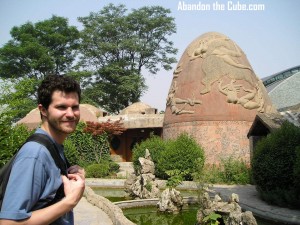First, a little background information on rental practices in China: In general, you sign a lease and pay your rent whenever you move in. No one waits for the first of the month to move. We signed our lease on a three-bedroom apartment in Dongchang district on the 21st of September, for example. You pay your rent in China by giving one month deposit and three months rent up front. You pay your rent every three months, essentially. Our lease was unique in that is stipulated two months deposit, two months rent.
 We had a hard time finding a three-bedroom apartment for us and our roommates. Once we finally did, our agent charged us over half a month rent for a finder fee. We later learned that the landlord paid the realty company a months rent, and we should not have paid a fee at all. The agent (named Sam) pocketed the money. We later learned that he was in cahoots with an agent at the company listing the apartment, a girl named Lina. (This all comes into play later!) The company listing the apartment, should you wish to avoid it, was 5i5j, one of China’s largest realty companies.
We had a hard time finding a three-bedroom apartment for us and our roommates. Once we finally did, our agent charged us over half a month rent for a finder fee. We later learned that the landlord paid the realty company a months rent, and we should not have paid a fee at all. The agent (named Sam) pocketed the money. We later learned that he was in cahoots with an agent at the company listing the apartment, a girl named Lina. (This all comes into play later!) The company listing the apartment, should you wish to avoid it, was 5i5j, one of China’s largest realty companies.
On the 15th of November, right before our rent was due for the second time, we were alerted that we were being evicted because the landlord had sold the apartment to a new owner who did not wish to rent it out. They told us we needed to be out by the end of the week. In a total panic (my parents were visiting from abroad and everyone was extremely busy) we consulted the lease and learned we had to be given ten days notice. We countered with this information and they begrudgingly accepted. They had tried to pull a fast one on us, hoping we wouldn’t be able to read the lease that was all in Chinese.
 Our contact with the rental company was a 30+ year old local named Lina (aforementioned). She spoke some English, which is why they probably assigned her to us. She admitted that we did get ten days, and told us they would be free, we didn’t need to pay for them. We had until the end of the month to be gone. This was all confirmed in English and Chinese, in multiple expressions so as to erase the issue of it possibly being a misunderstanding.
Our contact with the rental company was a 30+ year old local named Lina (aforementioned). She spoke some English, which is why they probably assigned her to us. She admitted that we did get ten days, and told us they would be free, we didn’t need to pay for them. We had until the end of the month to be gone. This was all confirmed in English and Chinese, in multiple expressions so as to erase the issue of it possibly being a misunderstanding.
It turned out Lina was telling us a series of lies to get us to do what she wanted, without any concern about the effect her lies would have on us and on her coworkers. Here’s how the misery of the eviction played out:
Lina lied about the ten days being free and the landlord showed up to collect the ten days rent, prorated. Since we asked repeatedly for this deal in writing and Lina refused, we had no evidence to support our claim.
Lina lied again when she told us all the furniture we purchased for the apartment would be bought by the landlord. When the landlord arrived she knew nothing about this arrangement. We lost all the money we spent on furniture, and had to leave it all behind because there was nowhere to move it. This was Lina’s second lie, and although we had text messages from Lina proving she promised this, the company and the landlord refused to agree.
Lina promised to find us a new apartment for free as part of the deal when breaking a lease with a client. This turned out to be a total scam run by Lina and her friend Sam. Lina showed us apartments that were so vile or so far out of our price range that she knew ahead of time we would reject them. Meanwhile, her accomplice (Sam, aforementioned) would show us nice ones in our price range. Her friend then tried to charge us a large finder’s fee, which he would split with Lina. She would make money on finding us an apartment, money being her ultimate goal here.
 I confronted Lina about these many lies and immoral practices and she turned bright red and refused to answer me. She showed up at our apartment the following day with two large gentlemen from the company and told us we had to be out of the apartment that night! It was around 5pm when she arrived with her ‘henchmen’ to evict us on the spot. We told her to get lost, and told the people with her about the many lies she had told us. She denied it all, and a series of yelling spats ensued. Eventually they left in a huff, but nearly as angry as we were. We were dealing with a greedy monster of a woman who was lying to everyone she encountered. Our poor roommate, this being their first time in China, were suffering through a horrible first impression of life in China.
I confronted Lina about these many lies and immoral practices and she turned bright red and refused to answer me. She showed up at our apartment the following day with two large gentlemen from the company and told us we had to be out of the apartment that night! It was around 5pm when she arrived with her ‘henchmen’ to evict us on the spot. We told her to get lost, and told the people with her about the many lies she had told us. She denied it all, and a series of yelling spats ensued. Eventually they left in a huff, but nearly as angry as we were. We were dealing with a greedy monster of a woman who was lying to everyone she encountered. Our poor roommate, this being their first time in China, were suffering through a horrible first impression of life in China.
The following day was the 30th, and we were informed that they would come to inspect for damages and return our deposit at 10:00am. They were over an hour late, and once they did arrive we learned they had only brought half the money they owed us for the eviction (our deposit plus two months rent for breaking the lease). The landlord arrived, more agents arrived, and the new owners arrived and began measuring the walls for their furniture. There were around ten people in the house, all together, as the madness unfolded.
We informed them that Lina told us we could stay for ten days for free. The landlord was shocked and refused on the spot. Lina didn’t arrive and her coworkers refused to honor any of her promises, despite any evidence we provided. We explained to them the massive series of lies we were told and that we were extremely unhappy about the whole affair. What happened next was shocking. They refused to give us the money until we signed a form saying we were leaving. We signed, and then they informed us they only had half the money we were owed and that we could collect the rest at their office at the end of the week. One of our roommates began to get furious and explained that he would literally not leave the premises until the money was delivered. I explained that our trust was betrayed and we were extremely hurt by the whole process. The agent we were dealing with apologized for Lina’s many lies but said they couldn’t honor any of them. He agreed to get us the money within the day, and the roommate would stay in the apartment until I called to say the money was in hand. The situation had deteriorated so much that we were literally leaving a human being in the apartment for our security until we had the money. If we left, they would have no reason to honor their promise to deliver the rest of the money they owed us. Since everything they had told us so far proved a lie, we didn’t actually know if we would get the money.
 Later that day I went to the company headquarters and had no problem getting the money, at which point I called and the roommate left the apartment. Our standoff having ended with us on the losing end in every respect. However, everyone I met at the company headquarters apologized for Lina’s behavior and one of the men pulled us aside and said, quote: “she does not respect herself and she does not represent the company, or myself.’ He was deeply ashamed of what had happened to us because of Lina, and he gave us his business card and said that if we ever had a problem in Beijing to call on him and he would help. He really wanted us to know that not all Chinese are like Lina and that he would help us with whatever problems we faced, as a friend. This was such a moving display that we totally forgot about Lina’s selfish methodology and greedy approach to life, and were instantly brightened by this gentleman’s offer of assistance.
Later that day I went to the company headquarters and had no problem getting the money, at which point I called and the roommate left the apartment. Our standoff having ended with us on the losing end in every respect. However, everyone I met at the company headquarters apologized for Lina’s behavior and one of the men pulled us aside and said, quote: “she does not respect herself and she does not represent the company, or myself.’ He was deeply ashamed of what had happened to us because of Lina, and he gave us his business card and said that if we ever had a problem in Beijing to call on him and he would help. He really wanted us to know that not all Chinese are like Lina and that he would help us with whatever problems we faced, as a friend. This was such a moving display that we totally forgot about Lina’s selfish methodology and greedy approach to life, and were instantly brightened by this gentleman’s offer of assistance.
The whole event was so horrific and spread out over half a month that one of the roommates decided to leave China altogether, having tired of what he saw as a place where he wasn’t welcome. I don’t blame him one bit! It was a horrible first experience in China! He claims that in all the places he has travelled, China is the only place where he has had such trouble and felt so unwelcomed, and why spend one moment of your life in a place where people don’t want you. He is now on his way to south-east Asia and the land of smiles. Mike and I decided to stay in China, and we’re sure we’ll find many, many more people like the gentleman who offered his help, than people like Lina. Good riddance to her, the only good side to this whole affair is that we’ll never have to interact with her again.



